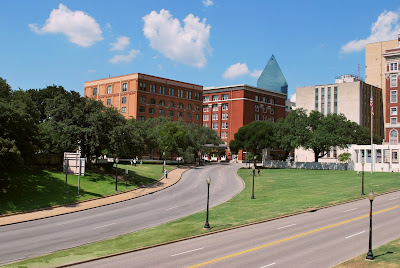An Act of Love: Adding Context to the Story of Fr. Hartnett
In my last post about Calvary Cemetery, I told the story of Father
Jeffrey Aloysius Hartnett, the first
priest ordained in and for the Dallas Diocese, who died of smallpox after
walking into a quarantined hospital to provide last rites for the sick and
dying. Not being Catholic myself, I wanted to better understand why this ritual
was so important that a priest would risk his life to administer last rites.
To get
some context, I spoke with Dr. Heidi Miller, Associate Professor of Christian Worship
with Southern Methodist University’s (SMU’s) Perkins School of Theology.
Although she was not familiar with the exact circumstances in Fr. Hartnett’s case,
she was able to provide some clarity regarding the significance of last rites
at the turn of the century.
In the act
of performing last rites (now known as the Anointing of the Sick), the priest’s
role is to represent the authority of the Church and to stand in for Christ by
extending the opportunity for absolution from sin through last confession,
acceptance of the Eucharist, anointment and prayer. Dr. Miller explained that prior to the
ideological shift that occurred within the Catholic Church in the 1960’s
(commonly referred to as Vatican II), it was believed that the soul of anyone
who did not receive last rites was in grave jeopardy.
“People
would have feared that they would not have salvation in the afterlife without
it,” Dr. Miller said. She advised that the
act of going toward the dying at personal risk was part of a tradition of
service that dates back to the early days of the Church.
“Christians
in the early 200s and 300s A.D. were known for going to wars where there were
massive outbreaks of disease and plagues, and they would go toward the sick and
care for the sick from both sides, which is how they became known for their
faithfulness,” Dr. Miller said. As an example, she reference Eusebius’ writings
on how Christians in 252 A.D. nursed Pagans in Carthage, despite Pagans being
outside the Church. “It’s an act of love.”
The takeaway from this is that although smallpox was extremely contagious and killed many at the turn of the century, Fr. Hartnett would have felt a sense of responsibility to perform last rites for the sick and dying to ensure that they (and their families) were comforted in knowing that the sick had received absolution for their sins and would be able to receive eternal salvation.
I
appreciate Dr. Miller’s clarification. Any errors here are my own.


Comments
Post a Comment